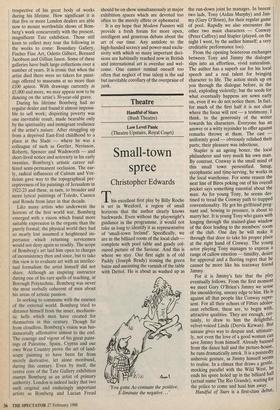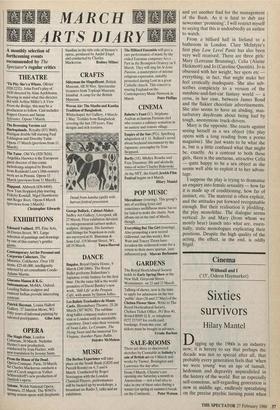Theatre
Handful of Stars (Bush Theatre) Low Level Panic (Theatre Upstairs, Royal Court)
Small-town spree
Christopher Edwards
This excellent first play by Billy Roche is set in Wexford, a region of small horizons that the author clearly knows backwards. Even without the playwright's guidance in the programme, it would not take us long to identify it as representative of 'small-town Ireland'. Specifically, we are in the billiard room of the local club complete with pool table and gaudy col- oured picture of the Saviour. And this is where we stay. Our first sight is of old Paddy (Joseph Brady) ironing the green baize and anointing the varnish of the table with Dettol. He is about as washed up as :You gotta Ac-centuate the positive, E-liminate the negative...' the run-down joint he manages. In breeze two lads, Tony (Aidan Murphy) and Jim- my (Gary O'Brien), for their regular game of pool. Rapidly we also encounter the other two main characters — Conway (Peter Caffrey) and Stapler (played, on the night I went, by the author himself; a very creditable performance too).
From the opening boisterous exchanges between Tony and Jimmy the dialogue slips into an effortless, vivid naturalism. The author has a superb ear for his local speech and a real talent for bringing character to life. The action steals up on you through the dialogue before, in the end, exploding violently; but the seeds for what eventually happens are sown early on, even if we do not notice them. In fact, for much of the first half it is not clear where the focus will rest — a testimony, I think, to the generosity of the writer towards his characters. Everyone has an answer or a witty rejoinder to offer against remarks thrown at them. The cast uniformly good — obviously relished their parts; their pleasure was infectious.
Stapler is an ageing boxer, the local philanderer and very much his own man. By contrast, Conway is the small mind of this small town personified. Smug, sycophantic and timeserving, he works in the local warehouse. For some reason the neat line of Biros poking out of his overall pocket says something essential about the man. As for young Tony, he seems des- tined to tread the Conway path to trapped conventionality. He got his girlfriend preg- nant and, bowing to pressure, is about to marry her. It is young Tony who gazes with longing through the stained-glass window of the door leading to the members' room of the club. One day he will make it through that door to take his proper place at the right hand of Conway. The young actor playing Tony manages to express a range of callow emotion — timidity, desire for approval and a fleeting regret that he cannot be more like his tearaway friend Jimmy.
For it is Jimmy's fate that the play eventually follows. From the first moment we meet Gary O'Brien's Jimmy we sense the smouldering, uneasy edge to him. He is against all that people like Conway repre- sent. For all their echoes of Fifties adoles- cent rebellion, these are, to begin with, attractive qualities. They are enough, cer- tainly, to draw to him the delightful, velvet-voiced Linda (Dervla Kirwan). But unease gives way to despair and, ultimate- ly, not even the love of a good woman can save Jimmy from himself. Already banned from the dance hall and the picture-house, he runs dramatically amok. It is a pointedly unheroic gesture, as Jimmy himself seems to realise. In a climax that draws a gentle, mocking parallel with the Wild West, he ends his spree holed up in the billiard hall (actual name The Rio Grande), waiting for the police to come and haul him away. Handful of Stars is a first-class debut, and yet another find for the management of the Bush. As it is fatal to dub any newcomer 'promising', I will restrict myself to saying that this is undoubtedly an author to watch.
From a billiard hall in Ireland to a bathroom in London. Clare McIntyre's first play Low Level Panic has also been very well received. There are three girls: Mary (Lorraine Brunning), Celia (Alaine Hickmott) and Jo (Caroline Quentin). Jo is obsessed with her weight, her spots etc — everything, in fact, that might make her feel erotically inadequate. She also sub- scribes completely to a version of the sunshine-and-fast-car fantasy world — a cross, in her case, between James Bond and the flakier chocolate advertisements. She also seems to have an abiding, mas- turbatory daydream about being had by tough, anonymous truck-drivers.
Mary is the opposite. She reacts against seeing herself as a sex object (the play opens with a long reading from a porno magazine). She just wants to be what she is, but is a little confused what that might be, exactly. As a contrast to both these girls, there is the unctuous, attractive Celia — quite happy to be a sex object as she seems well able to exploit it to her advan- tage.
I suppose the play is trying to dramatise an enquiry into female sexuality — how far it is made up of conditioning, how far of instinct, etc. The material is often explicit, and the attitudes put forward recognisable enough. But their realisation is plodding, the play monolithic. The dialogue seems vertical: Jo and Mary (from whom we mostly hear) launch into what are, essen- tially, static monologues explicating their positions. Despite the high quality of the acting, the effect, in the end, is oddly frigid.



















































 Previous page
Previous page